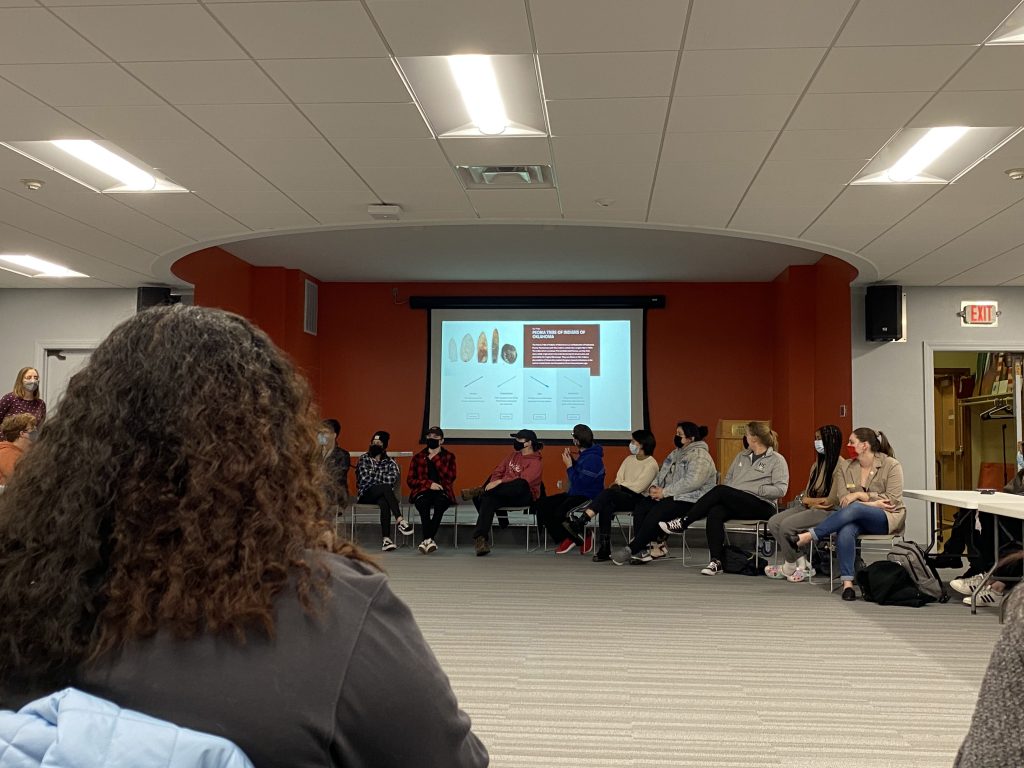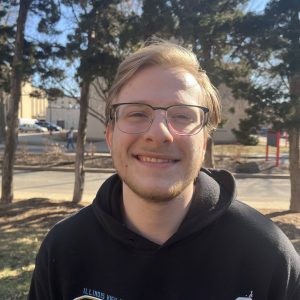
Here in the state of Illinois, we stand on native lands.
On Nov. 15 at 7 p.m. in the Garrett Center, in an event hosted by the Office of Diversity and Inclusion, Bradley students were visited by Peoria Indigenous activist and Bradley alumna Jo Lakota to discuss the topic of stolen native lands and the history of Indigenous people in Peoria.
The event started out with an introduction by Libby Tronnes, head of Virginius H. Chase Special Collections Center, who discussed the topic of ignorance and how to respect different cultures — specifically that of the Indigenous people.
“I think it’s important to think about who we are and to sometimes share that and share your relationship to a place with others,” Tronnes said.
At the end of her introduction speech, Tronnes left the audience with a small reminder about being a Bradley Brave, and told students that later on in the conversation, they would have a deeper understanding of the saying.
To start the conversation, a short video was played regarding the life of an Indigenous person and their fight to be acknowledged.
The video discussed what is known as a land acknowledgement, where a business, university, etc. recognizes that the land they occupy is stolen. Lakota mentioned that there is a church in Peoria that opens every service with a land acknowledgement that it was once the land of the Peoria people.
Tronnes and Lakota made it clear that while acknowledging the past is still crucial for today’s time, the past is not as far away as it may seem. Lakota mentioned that two struggles with Indigenous people have occurred in her lifetime, including Wounded Knee.
“I’m in my 70s, and you have to realize that in less than two of my lifetimes, this was native-occupied land,” Lakota said. “So it’s not a long time ago, and our memories don’t go away; it was yesterday for our people.”
Correlating with the point of land acknowledgment, Tronnes shared the violent past and why it should be important to people as it is an ongoing issue.
“I have heard that it’s been happening quite often,” Mia Chidichimo, a junior Spanish and health science double major, said. “[I] just heard about that one white vlogger [Gabby Petito] that was missing [and] how a lot of attention was brought to that and a lot of people kept bringing up that Indigenous women have been missing and there’s been no attention to that.”
While it is not that well-known to the current inhabitants of Peoria, there was a native tribe living here before getting forced off its land to Oklahoma. Tronnes told students that the Peoria tribe is a federalized tribe.
“The Peoria people are still out there,” Tronnes said. “Many of them are scattered around the U.S.”
After the mention of the Peoria tribe, attendees discussed Bradley’s old mascot, a crude cartoon of an Indigenous person.
Upon the discovery of the former mascot, students began to ask questions about if anyone stood up against the mascot while it was in use. Lakota said that if students spoke up against the mascot, their scholarship would be threatened. They had no choice but to put up with the mascot and the students and fans’ choices to dress up.
Tronnes revealed that the conversation of getting rid of the mascot was not brought back up until the 1990s, when it was replaced with a bobcat.
Tronnes directed the students to read the archived paper from 1993 that detailed the issue with the mascot.
The paper detailed how Bradley wanted to continue to use the Braves name and promised to increase the presence of Native American students on campus by giving out scholarships.
“I think it’s definitely something that they should continue to work on just because they preach so much about diversity and inclusion,” Chidichimo said.
Tronnes said that land acknowledgements and being aware and supportive of the indigenous communities that used to live in Peoria, and still do.
“It’s not about the land acknowledgment, [it’s about] creating those relationships with Indigenous communities near and far,” Tronnes said.
Tronnes then went on to talk about the map located on the event’s website. The map consisted of different Indigenous tribes in the surrounding area. She also discussed the subject of treaties between Indigneous people and people on stolen land wanting them to sign their home away.
Tronnes shared her love of Indigenous history and how it can shift perspective on the native people.
“Yes, I know I’m a historian and I say that [culture is interesting] all the time, but I mean it … you get to care about native people,” Tronnes said.



